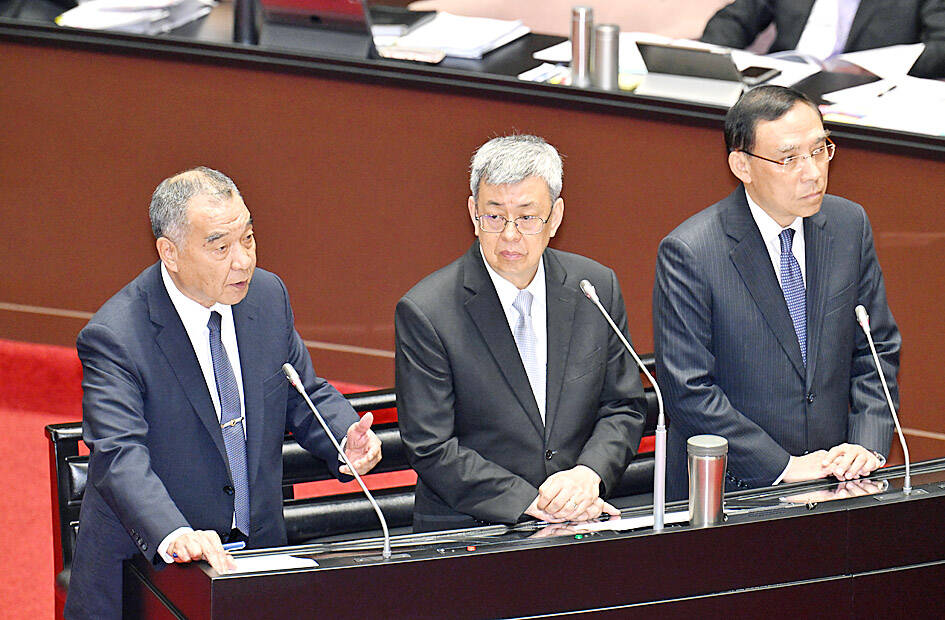The military is intensifying countermeasures to prevent Chinese infiltration of its ranks and stepping up evidence-gathering in espionage cases to facilitate prosecution, Executive Yuan officials said at a plenary session at the Legislative Yuan in Taipei yesterday.
That was in response to criticism by Democratic Progressive Party Legislator Liu Shyh-fang (劉世芳) that prison sentences meted out in national security law cases were too lenient.
Other countries hand out stiff sentences of 30 years to life in prison for members of the armed forces who spy on their country for a hostile power, Liu said.

Photo: Tien Yu-hua, Taipei Times
Citing data from the Ministry of Justice, Liu said that the average sentence handed out to people convicted of betraying secrets to Beijing was 6.18 months in prison, which is lax in light of the repeated warnings Taiwan has received from its allies about communist infiltration.
Minister of National Defense Chiu Kuo-cheng (邱國正) acknowledged that some unidentified military personnel who have been compromised by China might still be serving in security-sensitive positions in the armed forces.
About one-third of service members implicated in leaking national security secrets to China were on active duty, while the remainder were retirees, he said.
Military personnel must follow the law regardless of their service status and former service members who spy for China would still be held accountable, Chiu added.
Although the ministry cannot comment on the handling of espionage cases by the judicial system, the military has stepped up efforts to raise troop awareness against Beijing-directed espionage and is conducting investigations to gather potential evidence for prosecution, he said.
The Ministry of Justice agrees with the assessment that judges are handing down overly lenient sentences for national security breaches, but sentencing is a prerogative of the court, Minister of Justice Tsai Ching-hsiang (蔡清祥) said.
Should prosecutors have cause to appeal a sentence, they will pursue it to the full extent of the law, he added.
The justice ministry is collaborating with the defense ministry to educate prosecutors on the crucial importance of prosecuting espionage cases and plans to appoint special prosecutors to try espionage cases, he said.
Premier Chen Chien-jen (陳建仁) said the justice ministry has been instructed to improve law enforcement’s ability to obtain evidence that can help clinch heavier penalties in cases involving Beijing-directed espionage.
Prosecutors should be encouraged to appeal verdicts that do not fit the crime, he said.

Taiwan is to commence mass production of the Tien Kung (天弓, “Sky Bow”) III, IV and V missiles by the second quarter of this year if the legislature approves the government’s NT$1.25 trillion (US$39.78 billion) special defense budget, an official said yesterday. Commenting on condition of anonymity, a defense official with knowledge of the matter said that the advanced systems are expected to provide crucial capabilities against ballistic and cruise missiles for the proposed “T-Dome,” an advanced, multi-layered air defense network. The Tien Kung III is an air defense missile with a maximum interception altitude of 35km. The Tien Kung IV and V

The disruption of 941 flights in and out of Taiwan due to China’s large-scale military exercises was no accident, but rather the result of a “quasi-blockade” used to simulate creating the air and sea routes needed for an amphibious landing, a military expert said. The disruptions occurred on Tuesday and lasted about 10 hours as China conducted live-fire drills in the Taiwan Strait. The Civil Aviation Administration (CAA) said the exercises affected 857 international flights and 84 domestic flights, affecting more than 100,000 travelers. Su Tzu-yun (蘇紫雲), a research fellow at the government-sponsored Institute for National Defense and Security Research, said the air

A strong continental cold air mass is to bring pollutants to Taiwan from tomorrow, the Ministry of Environment said today, as it issued an “orange” air quality alert for most of the country. All of Taiwan except for Hualien and Taitung counties is to be under an “orange” air quality alert tomorrow, indicating air quality that is unhealthy for sensitive groups. In China, areas from Shandong to Shanghai have been enveloped in haze since Saturday, the ministry said in a news release. Yesterday, hourly concentrations of PM2.5 in these areas ranged from 65 to 160 micrograms per cubic meter (mg/m³), and pollutants were

Taiwan’s armed forces have established response protocols for a wide range of sudden contingencies, including the “Wan Chun Plan” to protect the head of state, the Ministry of Defense (MND) said today. After US President Donald Trump on Saturday launched a series of airstrikes in Venezuela and kidnapped Venezuelan President Nicolas Maduro, concerns have been raised as to whether China would launch a similar “decapitation strike” on Taiwan. The armed forces regularly coordinate with relevant agencies and practice drills to ensure preparedness for a wide range of scenarios, Vice Minister of National Defense Hsu Szu-chien (徐斯儉) told reporters before a